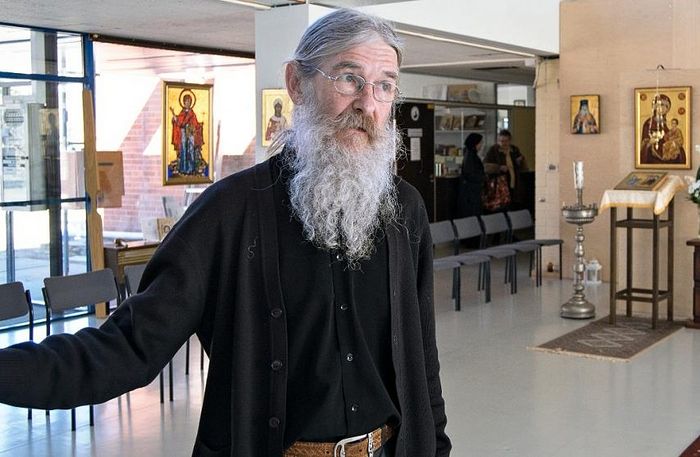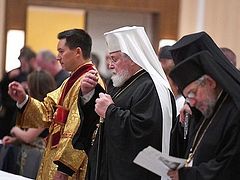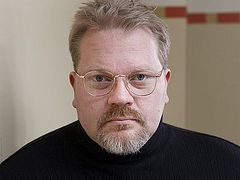The Finnish town of Lammi was animatedly discussing the following news: some “people in black” were purchasing an enormous plot of land where a hospital complex used to stand. The administration representatives were rubbing their hands in excitement: “We will reduce the building maintenance expenses and will be able to save so much money!” Though not all cautious residents of Lammi shared the joy of the town authorities: “Who are these ‘people in black’ that have come here? They say they are Orthodox and they want to establish a community according to some ‘Athonite’ rules…”
Six years passed, and the original liveliness developed into a keen interest and permanent good relations. It turned out that the strange “people in black” were Dr. Hannu Pöyhönen and some of his students who had come to the conclusion that theoretical knowledge of Orthodoxy should be combined with life according to the Gospel. As has been shown in practice, this opinion of Dr. Pöyhönen and his students is being shared by more and more residents of one of the most densely populated regions of Finland. “In essence, this is why we came here and live here,” he says. “To acquaint people with Orthodoxy and to live with Christ—this is the purpose of our life here. The Gospel should be preached, but it is only possible if you try to live by the Gospel.”
We talked with Hannu in a cell in the living quarters of the monastic community, which is still being set up.
Meetings over coffee, the Gospel, and Fr. Ephraim’s advice
—Dr. Pöyhönen, how did this story begin? How did an Orthodox community appear in the sleepy town of Lammi?
—I used to teach theology at the Orthodox college of New Valaam Monastery [at Heinävesi, Finland.—Trans.] for many years. From 1997, with the blessing of Archbishop John [also Johannes (Rinne; 1923—2010), Metropolitan of Karelia and All Finland and primate of the autonomous Finnish Orthodox Church between 1987 and 2001.—Trans.] I taught Orthodox theology at University of Eastern Finland in the city of Joensuu, for which I took an unpaid leave at college. In Joensuu I lived at the dormitory of the theological seminary in the room that was intended for clergy and situated close to the rooms for seminarians. In my eyes they were like a flock of sheep without a shepherd (cf. Mt. 9:36). Seeing their situation, I suggested that they come to me for coffee after the Liturgy, if they so desired. And a small group of seminarians accepted my invitation. There were between four and seven of them. At each meeting we would discuss matters related to spiritual life.
In Finland Orthodox communities are usually given spiritual care only by one priest. As a result, new graduates of the seminary very soon find themselves in difficult circumstances, serving at their parishes all alone. One day I told them: “When you graduate from the seminary, don’t forget each other and don’t lose your motivation for the Church ministry.” After a short pause one seminarian asked me if in that case we should found a public organization. I was captivated by this idea, and one day during my stay on Mt. Athos, where I came to visit my Finnish friend at Philotheou Monastery, now Hieromonk Joseph, I asked for Abbot Ephraim’s blessing. Fr. Ephraim replied that I must found a community, because in our days an individual will hardly ever achieve anything alone by private initiative.
Thus, in 2000, my seminarians, other friends and I established the Brotherhood of St. Cosmas of Aetolia. We began to publish writings of great ascetics of Holy Mount Athos of modern times and other contemporary saints and gather three times a year for a weekend for the joint participation in services and spiritual talks. Thanks to those meetings our dream of our own premises for meetings was born. In 2011, this process gained momentum. Again we asked for Fr. Ephraim’s advice—by that time he had become Abbot of St. Andrew’s Skete on Mt. Athos. He supported our initiative, and we set up “The Fund of All the Saints Who Shone Forth on Mt. Athos” for fundraising in Finland, and with the blessing of hierarchs of our Local Orthodox Church we started looking for a suitable place in the south of Finland, where the country’s Orthodox population is mainly concentrated.
And the first place in which we found ourselves was this very place, where we are talking now. Although it is beautiful and quiet here, then I thought it was unreasonable to obtain the complex due to the large number of buildings that need maintenance to keep them in good working order. But Elder Ephraim insisted that this place was for us. And after a series of difficult yet miraculous events we obtained this complex. We took up our residence here in summer 2013. From the very beginning we wanted to have two Orthodox monasteries here living according to the Athonite rules—a community for monks and a community for nuns. Since there are as many as twenty-two buildings here, we thought of undertaking socially oriented kinds of activity appropriate to monasteries: for example, opening a nursing home for elderly Orthodox lay-people and a private Orthodox school. Time will show which of these projects will be undertaken in due course.
The main thing is to persist
—How would you asses the state of Christianity in Finland? As I see it, it is very good; there are no persecutions, nothing prevents Christians from living a Christian life, going to church, and studying Orthodoxy at schools. Am I right?
—In my judgment, Finland is a typical Western country. Christian values are being destroyed with increasing speed. Nothing in modern society encourages a Christian way of life. And this affects the education system. Religion is still taught in Finnish schools, including the subject “Fundamentals of Orthodox Culture” for Orthodox students. But, strange as it may seem, prayer is not allowed during religious lessons! Icons can be present at lessons, candles can be lit, but only for educational purposes and not as an act of confession of faith. Christian feasts are no longer celebrated in schools of our country—the formal cause of this is the presence of representatives of other religions in Finland and the tendency to tolerance.
There have been no cases of discrimination or persecution on religious grounds in Finland so far. Each citizen has a right to go to church and practice his faith freely. At the same time, public pressure hinders visible adherence to the traditional Christian ideals. It is seen in an extreme form when it comes to sexual ethics. It is evident that even leaders of denominations have taken a very prudent stance in their public statements so as to avoid being labelled as “racists”. The matters of “gender equality” have become more urgent than the preservation of Church tradition. This caution is primarily explained by the fact that young members of communities leave the Evangelical Lutheran Church of Finland easily, and we can see the same tendency in the Orthodox Church as well. So we will inevitably have to choose between looking for quantity or quality in our Church. On the other hand, I believe that, in striving to preserve the age-old Orthodox tradition, our Local Church could attract many new parishioners from among the former Lutherans whose expectations were not met in the environment of the modern public pressure. In my view, our Church should hold the line so adherents of other faiths seeking another “spiritual refuge” for themselves and their families can see us withstand these trials and see our reliable support in the preservation of Christian values. Our promise is to be faithful to Christ. We cannot betray Him without suffering and without causing others to suffer. The Church should remain the salt of the earth, even if it has to pay dearly for this.
This is what the situation in Finland is like. On the other hand, on the basis of the Gospel and the whole of the Holy Scriptures we can assert that Christians will be persecuted everywhere, if they apply the teaching of Christ in their lives. We shouldn’t forget that even in trying circumstances we can remain happy, when we don’t have pangs of conscience about our cowardice and compromises for the sake of a comfortable life.
The right to cautious slowness
—How is your community treated by people?
—We live in the southern province of Häme, where the experience of Orthodox life is still insignificant. Despite this, the locals gave us a warm welcome. Some sincerely rejoiced because this complex had been sold to us. Groups of local parishioners, public cultural organizations and pensioners come to us. The first experience of Orthodoxy can be compared to the freshness of the sea, and this stays in people’s memory for a long time. However, local residents hardly ever resolve to come to our services separately. We hope that in due time the situation will change for the better, all the more so because residents of Häme province are famous for their slowness…
As for our church, many prefer to take on the role of observers—to see whether our community of the faithful will disappear or develop. Perhaps this concerns not only our community. Every human being has the freedom to doubt, and the right to observe and “derive inspiration slowly”. True, among our coreligionists there are those for whom monastic life in the contemporary world doesn’t matter at all. In addition, there are those who fear that the Orthodoxy of Mt. Athos can become stronger in this country and we will return to the point when our Local Church was far from modern tendencies in society.
Very sensitive lessons in humility
—I am quite sure that one of the main difficulties of your monastery is an economic one. I am even afraid to imagine your heating and electricity bills… How do you cope with this?
—The maintenance expenses are commensurate with our complex’s large area. For saving costs on heating, five years ago we acquired a thermal power plant, which works on wood chips. That unique modern complex was supposed to provide us with electricity as well. Unfortunately, it fell short of our expectations due to a lot of defects. Through last winter we had to heat the buildings with light fuel oil, which is three times as expensive as wood chips in Finland. This winter we had the same situation with heating. The buildings that we don’t use are not heated, and no water is left in their heating pipes. As for the other buildings, a minimal level of temperature needed for keeping heating pipes in working condition is maintained in them. The temperature in many buildings doesn’t exceed ten degrees Celsius, and in cells and workrooms we use electric radiators. For this reason our electricity bills remain extremely high.
Although our problems with heating have to do with technical failures, we all realize that the true reasons behind this are spiritual and manifest themselves in reality in this way. Destroying a monastery before its foundation would give the greatest joy to the evil spirits! It seems inconceivable to somebody who has never lived in a monastery that a spiritual warfare like this can exist. Here we have experienced many things that we could have never imagined before.
Beyond all doubt, the Lord is allowing these trials to befall us. Through them He tests how much we want this monastery to appear and how much we are ready to endure in order to achieve our striving. He teaches us humility in this way. We must admit that we are not strong and wise enough to attain this aim, though we have been doing all in our power to succeed. Once the Abbot of St. Andrew’s Skete Fr. Ephraim said to us that a large monastic community, a “big lavra” of worldwide importance would appear here in due course. If this promise is to be fulfilled, then we shouldn’t worry because it will happen not through our efforts. He also said that if the evil one puts a tremendous amount of effort in destroying one monastery, then what can we say about two monasteries which are being set up? During the earliest stage of our preparation one Athonite elder who is now venerated as a saint looked into my eyes and told me in a very serious voice: “Be prepared for severe trials and tribulations.” And we have lived with them for nearly six years in the spirit of the Book of Job.
But, to be honest, it would be unfair to speak only about problems. We have experienced the grace of God and His help in abundance. We were on the verge of disaster many times but were saved at the very last moment. It is a great miracle we have existed through this period, while we had been told our life would last a year maximum. Intensive prayers and help of ordinary people were the “bearers” of Divine grace without which one cannot last out for a single day.
Holy naturalness and natural holiness as a model
—Why have you been organizing the life of your community according to the rules of Mt. Athos?
—The holy fathers of Mt. Athos (Hagiorites) left an indelible impression on us. They renounced everything in the world and strove for salvation in obedience to their spiritual fathers and unceasing prayer. Besides, they radiate light, they are natural, ingenuous; and you feel at ease and often cheerful and happy in their company.
The strength of tradition of Holy Mount Athos is validated precisely by the fact of life of these holy men. I do believe that Athonite monasticism can help our contemporaries acquire many spiritual gifts. Our life is becoming superficial, and not everybody is ready to agree with this. For many people, meaning, depth, and naturalness are very important. And it is something that the Orthodox Church, which was founded by Christ, can give them—not the least in monastic communities, where a deep spiritual life is practiced. We earnestly hope that visiting our place will give travelers, though incomplete, the experience of life in the spirit of the Hagiorite Fathers (though this resemblance is very remote), the peace of mind, hope, and the joy of communion with God in Church services and joint prayers. And we will be happy to meet every guest as a unique personality that bears a particle of eternity in himself. For each one of us is eternal. And may God grand us to spend eternity with Christ.
(To be continued).








